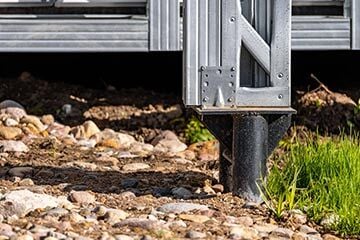A loss adjuster is an insurance industry expert that investigates the cause of a claim and the costs needed to fix it.
They do this because damage to your home could be more or less severe than you think. The cost of repairs can vary too. For example, damage caused by a burst pipe could be more serious if the electrics are compromised. Here's more detail on what a loss adjustor does.

What does a loss adjuster do?
A loss adjuster should assess any damage and, if your home insurance is valid, provide an estimate of the costs involved to fix it. Their aim is to examine what’s happened to cause you to make a claim.
They're usually only sent out to investigate large insurance claims, such as damage from a major storm or flood.
Their investigation ensures that you're claiming the right amount to fix the damage caused.
Although they work for your home insurance provider, it's not their job to reduce the value of your claim. In some cases, the loss adjuster might determine you're claiming too little and recommend increasing your payout.
Loss adjusters only assess claims that are covered by your home insurance policy. Anything outside of this isn’t considered.
What does a loss adjuster look for?
When they visit your home, a loss adjuster looks for:
- The cause of the incident
- Whether the damage is covered by your home insurance policy
- The value of loss or damage
- Whether you've met your policy's terms and conditions
- Whether the amount you're claiming for is reasonable and correct
Loss adjusters often take photographs of any visible damage they see. This should act as evidence for their report.
Once they’ve identified the cause of the claim and calculated the cost of repairs, a loss adjuster then assesses the amount you’ve claimed for. This is to ensure it matches their conclusion.
When the loss adjuster has completed their survey, they write up a report that’s submitted to your insurer. You should also get a copy.
Are loss adjusters impartial?
Although loss adjusters work for insurance companies, their job isn't to minimise your claim or save your insurer money.
They’re professionals with their own codes of conduct. Loss adjusters must also adhere to the rules set by the Financial Conduct Authority (FCA), meaning they must be impartial in their decisions.
Loss adjusters are governed by 3 organisations:
- The Association of British Insurers
- The General Insurance Standards Council
- The Chartered Association of Loss Adjusters
While they must be impartial, the loss adjuster’s job is to establish how the incident that led to the claim occurred. This might involve asking you some potentially uncomfortable questions. This is because they’re required to rule out instances of fraud.
How can I help the loss adjuster speed up the process?
The loss adjuster needs as much information from you as possible. It's helpful to provide this before their visit.
Find any receipts for items you’ve included in the claim and be honest with them when they ask questions.
If you don’t have all the information they ask for, you can give it to them another time. They can email you with any further questions.
If possible, don’t clean any mess caused by the incident or throw away anything that was affected. But, if you must get rid of damaged items, take photos of them first.
If emergency work needs to be done, such as replacing broken windows or doors, inform your home insurance company upfront. Again, take photos of the damage beforehand and keep the receipts for the work done.
Can a loss adjuster's decision result in my claim being rejected?
A loss adjuster's decision may result in your claim being rejected if they determine:
- You don't have the correct level of home insurance cover
- You're withholding information
- The damage is a result of natural wear and tear
- You haven't met the terms and conditions of the policy
Whether a loss adjuster has the final decision on the claim’s status depends on the arrangement they have with your insurer.
In some cases, the home insurance company immediately accepts the loss adjuster’s report. In others, it’s treated as a recommendation and is considered alongside their own expert’s conclusions.
How to appeal a loss adjuster's decision
If the insurer says they’re rejecting your claim following the loss adjuster’s report, you have the right to appeal.
You need to prepare and present your reasons for believing the loss adjuster and insurer were incorrect or acted unfairly. Be as accurate as possible and include a precise timeline from the incident that prompted the claim up to the decision to reject it.
Should your appeal fail and you’re still not satisfied with the insurer’s reasoning, you can take the matter to the Financial Ombudsman Service. You need to do this within 6 months of the insurer’s final decision.
The Ombudsman should evaluate both sides of the case and issue an outcome based on their independent investigations. This decision is then binding on the insurer.
You can do this whether or not you’ve used a loss assessor.
What’s the difference between a loss adjuster and a loss assessor?
A loss assessor represents you rather than the insurer. You’d usually hire a loss assessor if you weren’t happy with the loss adjusters final report.
They can negotiate on your behalf and deal with all the paperwork involved. Being insurance experts, they’re well-educated in claims-related arguments.
Loss assessors can also organise alternative accommodation if your home is uninhabitable. They can ensure your property is secure following a break-in or after fire damage to help ease your worry while you're out of your home.
For all of these reasons, it’s best to consider hiring a loss assessor as soon as you suspect there could be conflict over the settlement figure.
Can I hire a loss assessor?
You have a legal right to challenge a loss adjuster’s conclusion by hiring a loss assessor. You can contact a loss assessor through their trade body, the Institute of Public Loss Assessors.
If you get a recommendation from a friend or colleague, ensure the loss assessor is authorised by the FCA by searching the Financial Services Register.
Can I hire a loss adjuster instead?
Although they’re more commonly used by insurers, it’s possible to hire another loss adjuster to oversee your claim.
Conducting the investigation and producing the report involves more work than that required of a loss assessor. This means it can cost more to employ a loss adjuster than a loss assessor.
Typically, loss adjusters charge an hourly rate or work for a percentage of the settlement figure, depending on the scale and nature of the claim.
It’s also possible to buy insurance to cover the cost of a loss adjuster’s fees. But you need to speak to your insurer beforehand to check if your policy covers this.







